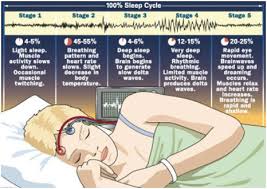The moon is shining in it's glory,The night is dark and calm, Peace lies within the mind, It is the perfect time to unwind, So, sleep well is my only wish for you,For tomorrow will be a day so new, For today, good night, And, yes sleep tight!
- Wish A Friend
All About Sleep
Although you will spend about one-third of your life doing it, the importance of sleep is often ignored. Getting enough sleep is even more critical to your health than following a strict diet or daily exercise routine.
Quality sleep is the foundation for good health. It is vital for your body to rebuild tissues, replenish cells and reclaim lost energy.
While you are sleeping your body is busy cleaning up. Your systems are busy flushing out toxins, replacing cells, repairing damaged tissues and restoring your energy supply. Sleep gives your body the time to heal and recover so you can take on the new day.
How Sleep Works
While awake, your body produces a chemical called 'adenosine' which adds up throughout the day and eventually causes drowsiness; letting you know you are ready for bed.
You have two systems that control your sleep patterns. The first - your biological clock and the second - your sleep drive.
Your biological clock (or circadian rhythm) is the biochemical cycle that repeats about every 24 hours and governs sleep, wake time, hunger, body temperature, hormone release and other rhythms that mesh with the 24 hour day.
Your need for sleep (sleep drive) dictates the amount and intensity of sleep you need based on how long you've been awake. Think of this sleep drive like your hunger drive; it builds throughout the day until it is satisfied.
The Impact of Sleeplessness
A study done at Harvard University showed that when only getting five hours of sleep a night, you adversely affect your brain's ability to remember important information.
Sleeplessness can lead to encoding failure which manifests in behaviors like forgetting where you left your keys or the date of a birthday party you planned to attend. It also adversely impacts one's attention and reaction time.
Sleeplessness is also associated with sudden disasters like car accidents. Statistics show that drowsy driving is just as bad as driving drunk.
Sleep and Physical Health
While sleeping, your body is taking the time to rest, recover and rebuild so it can perform at it's best the next day. Sleep recharges your heart and cardiovascular system while a continuous lack of sleep or serious sleep disorders have been linked to hypertension, increased stress hormone levels and irregular heartbeat.
A lack of sleep also alters the body's immune function. Your immune system serves as your body's defense mechanism, protecting you from foreign invaders, which allows your body to fight off sickness and disease. Keeping up with sleep may also help fight cancer.
When you don't get the sleep you need on a regular basis, your circadian rhythm gets out of sync which in turn harms your hormone levels. Hormones regulate everything from your menstrual cycle to your hunger levels.
Without getting enough sleep, it can disrupt your body's ability to know when it's satisfied. The hormones responsible for making you feel full or hungry can get out of sync causing you to feel hungrier than you should.
According to the National Institute of Health, short sleepers on average consume 500 more calories per day than people of the same age who slept 7 hours each night.
Sleep and Emotional Health
Sleep loss may also result in mood changes. Irritability, impatience, inability to concentrate and overall general moodiness becomes the norm. Lacking the sleep you need can leave you too tired to do the things you like to do.
Bottom line - a short-lived bout of insomnia is generally nothing to worry about. The bigger concern is chronic sleep loss which contributes to health problems.








Comments